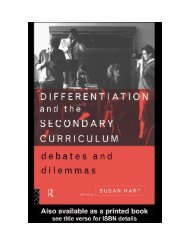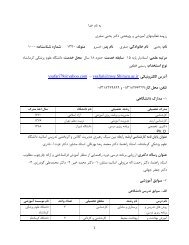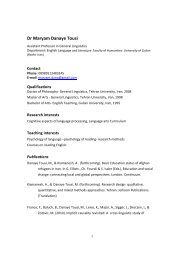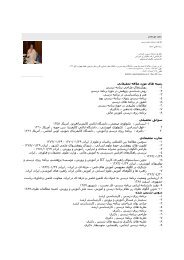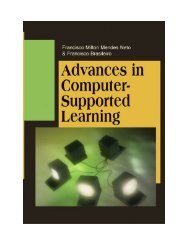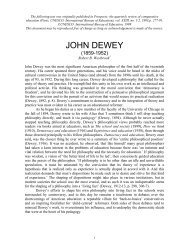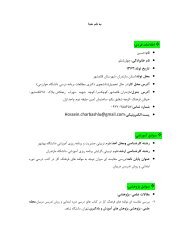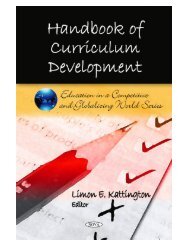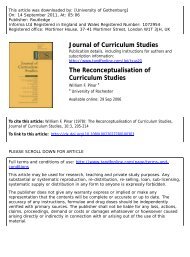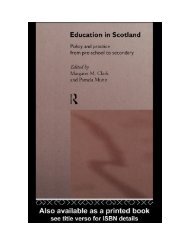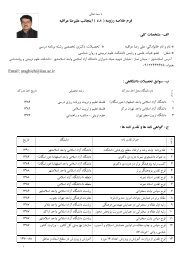- Page 2:
C u r r i c u l u m=
- Page 5 and 6:
Published by Rowman & Littlefield P
- Page 7 and 8:
We wish all men to be educated in a
- Page 9 and 10:
v i i i ■ C o n t e n t sThe Five
- Page 11 and 12:
x ■ c o n t e n t sIan Westbury a
- Page 14 and 15:
Figures and TextboxesFigures1.1 Cur
- Page 16 and 17:
ForewordThe Future of Our Making: R
- Page 18 and 19:
analyses of curriculum thought and
- Page 20 and 21:
F o r e wo r d ■ x i xpolicy. Whe
- Page 22:
normative beliefs about education a
- Page 25 and 26:
x x i v ■ P r e fac eto create go
- Page 28 and 29:
AcknowledgmentsNo author has ever w
- Page 30:
A Note to the ReaderTheory to Pract
- Page 33 and 34:
2 ■ i n t r o d u c t i o nfor cu
- Page 35 and 36:
4 ■ i n t r o d u c t i o nand pr
- Page 37 and 38:
6 ■ i n t r o d u c t i o npoliti
- Page 39 and 40:
8 ■ i n t r o d u c t i o nn What
- Page 41 and 42:
1 0 ■ i n t r o d u c t i o ntrad
- Page 44:
P a r tICurriculumTraditions=
- Page 47 and 48:
1 6 ■ C h a p t e r 1To be free-m
- Page 49 and 50:
1 8 ■ C h a p t e r 1The roots of
- Page 51 and 52:
2 0 ■ C h a p t e r 1wisdom, scie
- Page 53 and 54:
2 2 ■ C h a p t e r 1balanced cur
- Page 55 and 56:
2 4 ■ C h a p t e r 1city as a wh
- Page 57 and 58:
2 6 ■ C h a p t e r 1n Joseph Sch
- Page 59 and 60:
2 8 ■ C h a p t e r 1“schools s
- Page 61 and 62:
3 0 ■ C h a p t e r 1commonplace
- Page 63 and 64:
3 2 ■ C h a p t e r 1At the other
- Page 65 and 66:
Figure 1.1. Curriculum Map
- Page 67 and 68:
3 6 ■ C h a p t e r 1This extreme
- Page 69 and 70:
3 8 ■ C h a p t e r 2see themselv
- Page 71 and 72:
4 0 ■ C h a p t e r 2the latest s
- Page 73 and 74:
4 2 ■ C h a p t e r 2importance o
- Page 75 and 76:
4 4 ■ C h a p t e r 2account. As
- Page 77 and 78:
4 6 ■ C h a p t e r 2comparing of
- Page 79 and 80:
4 8 ■ C h a p t e r 2Taylor’s S
- Page 81 and 82:
5 0 ■ C h a p t e r 2curriculum-d
- Page 83 and 84: 5 2 ■ C h a p t e r 2their activi
- Page 85 and 86: 5 4 ■ C h a p t e r 2to privatize
- Page 87 and 88: 5 6 ■ C h a p t e r 2involved. Sc
- Page 89 and 90: 5 8 ■ C h a p t e r 2Systematic c
- Page 91 and 92: 6 0 ■ C h a p t e r 2Systematic c
- Page 93 and 94: 6 2 ■ C h a p t e r 2subject of c
- Page 95 and 96: 6 4 ■ C h a p t e r 2Another prob
- Page 98 and 99: =C h a p t e r 3Existentialist Curr
- Page 100 and 101: E x i s t e n t i a l i s t C u r r
- Page 102 and 103: E x i s t e n t i a l i s t C u r r
- Page 104 and 105: E x i s t e n t i a l i s t C u r r
- Page 106 and 107: y offering them meaningful experien
- Page 108 and 109: E x i s t e n t i a l i s t C u r r
- Page 110 and 111: E x i s t e n t i a l i s t C u r r
- Page 112 and 113: E x i s t e n t i a l i s t C u r r
- Page 114 and 115: E x i s t e n t i a l i s t C u r r
- Page 116 and 117: curriculum by reminding us that the
- Page 118 and 119: =C h a p t e r 4Radical CurriculumI
- Page 120 and 121: R a d i c a l C u r r i c u l u m
- Page 122 and 123: seek to expand the space created by
- Page 124 and 125: R a d i c a l C u r r i c u l u m
- Page 126 and 127: R a d i c a l C u r r i c u l u m
- Page 128 and 129: economic oppression. To argue for h
- Page 130 and 131: R a d i c a l C u r r i c u l u m
- Page 132 and 133: R a d i c a l C u r r i c u l u m
- Page 136 and 137: preferably in social studies classe
- Page 138 and 139: R a d i c a l C u r r i c u l u m
- Page 140 and 141: R a d i c a l C u r r i c u l u m
- Page 142 and 143: R a d i c a l C u r r i c u l u m
- Page 144 and 145: R a d i c a l C u r r i c u l u m
- Page 146 and 147: doubt that powerful groups have opp
- Page 148 and 149: =C h a p t e r 5Pragmatic Curriculu
- Page 150 and 151: P r ag m at i c C u r r i c u l u m
- Page 152 and 153: P r ag m at i c C u r r i c u l u m
- Page 154 and 155: the obsession with system building
- Page 156 and 157: and that any ‘course of study’
- Page 158 and 159: Nor is this a model.” 11 During t
- Page 160 and 161: carries less appeal. The idea that
- Page 162 and 163: P r ag m at i c C u r r i c u l u m
- Page 164 and 165: P r ag m at i c C u r r i c u l u m
- Page 166 and 167: he makes the point that industriali
- Page 168 and 169: P r ag m at i c C u r r i c u l u m
- Page 170 and 171: P r ag m at i c C u r r i c u l u m
- Page 172 and 173: P r ag m at i c C u r r i c u l u m
- Page 174 and 175: P r ag m at i c C u r r i c u l u m
- Page 176 and 177: P r ag m at i c C u r r i c u l u m
- Page 178 and 179: P r ag m at i c C u r r i c u l u m
- Page 180 and 181: =C h a p t e r 6Deliberative Curric
- Page 182 and 183: D e l i b e r at i v e C u r r i c
- Page 184 and 185:
D e l i b e r at i v e C u r r i c
- Page 186 and 187:
the others. It provides a vision of
- Page 188 and 189:
D e l i b e r at i v e C u r r i c
- Page 190 and 191:
D e l i b e r at i v e C u r r i c
- Page 192 and 193:
D e l i b e r at i v e C u r r i c
- Page 194 and 195:
D e l i b e r at i v e C u r r i c
- Page 196 and 197:
D e l i b e r at i v e C u r r i c
- Page 198 and 199:
“states of affairs.” These two
- Page 200 and 201:
D e l i b e r at i v e C u r r i c
- Page 202 and 203:
is an art of doing. Architectonic a
- Page 204 and 205:
the four traditions discussed so fa
- Page 206 and 207:
D e l i b e r at i v e C u r r i c
- Page 208 and 209:
D e l i b e r at i v e C u r r i c
- Page 210 and 211:
D e l i b e r at i v e C u r r i c
- Page 212 and 213:
Figure 6.1. Curriculum Map with Aut
- Page 214:
P a r tIIFrom Theoryto Practice=
- Page 217 and 218:
1 8 6 ■ C h a p t e r 7to resolve
- Page 219 and 220:
1 8 8 ■ C h a p t e r 7population
- Page 221 and 222:
1 9 0 ■ C h a p t e r 7relation t
- Page 223 and 224:
1 9 2 ■ C h a p t e r 7Resolving
- Page 225 and 226:
1 9 4 ■ C h a p t e r 7standards
- Page 227 and 228:
1 9 6 ■ C h a p t e r 7Ashton stu
- Page 229 and 230:
1 9 8 ■ C h a p t e r 7enough of
- Page 231 and 232:
2 0 0 ■ C h a p t e r 7Textbooks
- Page 233 and 234:
2 0 2 ■ C h a p t e r 7agree to a
- Page 235 and 236:
2 0 4 ■ C h a p t e r 7With the p
- Page 237 and 238:
2 0 6 ■ C h a p t e r 7the memori
- Page 239 and 240:
2 0 8 ■ C h a p t e r 7studies te
- Page 242 and 243:
=C h a p t e r 8How Can We Reinstit
- Page 244 and 245:
H ow C a n W e R e i n s t i t u t
- Page 246 and 247:
H ow C a n W e R e i n s t i t u t
- Page 248 and 249:
H ow C a n W e R e i n s t i t u t
- Page 250 and 251:
H ow C a n W e R e i n s t i t u t
- Page 252 and 253:
H ow C a n W e R e i n s t i t u t
- Page 254 and 255:
H ow C a n W e R e i n s t i t u t
- Page 256 and 257:
H ow C a n W e R e i n s t i t u t
- Page 258 and 259:
H ow C a n W e R e i n s t i t u t
- Page 260 and 261:
H ow C a n W e R e i n s t i t u t
- Page 262 and 263:
H ow C a n W e R e i n s t i t u t
- Page 264:
H ow C a n W e R e i n s t i t u t
- Page 267 and 268:
2 3 6 ■ C h a p t e r 9with curri
- Page 269 and 270:
2 3 8 ■ C h a p t e r 9the need f
- Page 271 and 272:
2 4 0 ■ C h a p t e r 9have as ma
- Page 273 and 274:
2 4 2 ■ C h a p t e r 9Political
- Page 275 and 276:
2 4 4 ■ C h a p t e r 9a direct r
- Page 277 and 278:
2 4 6 ■ C h a p t e r 9Provost Ba
- Page 279 and 280:
2 4 8 ■ C h a p t e r 9has grown
- Page 281 and 282:
2 5 0 ■ C h a p t e r 9Hill Board
- Page 283 and 284:
2 5 2 ■ C h a p t e r 9One of the
- Page 285 and 286:
2 5 4 ■ C h a p t e r 9assure Pro
- Page 287 and 288:
2 5 6 ■ C h a p t e r 9A powerful
- Page 289 and 290:
2 5 8 ■ C h a p t e r 9possess a
- Page 291 and 292:
2 6 0 ■ C h a p t e r 1 0in part
- Page 293 and 294:
2 6 2 ■ C h a p t e r 1 0For thos
- Page 295 and 296:
2 6 4 ■ C h a p t e r 1 0busy tea
- Page 297 and 298:
2 6 6 ■ C h a p t e r 1 0past to
- Page 299 and 300:
2 6 8 ■ C h a p t e r 1 0The rela
- Page 301 and 302:
Figure 10.1. Curriculum Deliberatio
- Page 303 and 304:
2 7 2 ■ C h a p t e r 1 0inspirat
- Page 305 and 306:
2 74 ■ C h a p t e r 1 07. What v
- Page 307 and 308:
2 7 6 ■ A p p e n d i xn Curricul
- Page 309 and 310:
2 7 8 ■ A p p e n d i xBecause of
- Page 311 and 312:
2 8 0 ■ A p p e n d i xeverything
- Page 313 and 314:
2 8 2 ■ A p p e n d i xwhat Mr. S
- Page 315 and 316:
2 8 4 ■ A p p e n d i xmust compl
- Page 317 and 318:
2 8 6 ■ N ot e s to pag e s x v i
- Page 319 and 320:
2 8 8 ■ N ot e s to pag e s 3 8 -
- Page 321 and 322:
2 9 0 ■ N ot e s to pag e s 6 4 -
- Page 323 and 324:
2 9 2 ■ N ot e s to pag e s 1 0 1
- Page 325 and 326:
2 9 4 ■ N ot e s to pag e s 1 4 2
- Page 327 and 328:
2 9 6 ■ N ot e s to pag e s 1 7 7
- Page 329 and 330:
2 9 8 ■ B i b l i o g r a p h yCa
- Page 331 and 332:
3 0 0 ■ B i b l i o g r a p h y
- Page 333 and 334:
3 0 2 ■ B i b l i o g r a p h ySc
- Page 335 and 336:
3 0 4 ■ i n d e xCahoone, Lawrenc
- Page 337 and 338:
3 0 6 ■ i n d e xDartmouth Univer
- Page 339 and 340:
3 0 8 ■ i n d e xcollege and univ
- Page 341 and 342:
3 1 0 ■ i n d e x157; existential
- Page 343 and 344:
3 1 2 ■ i n d e xtelos, 32, 179,



